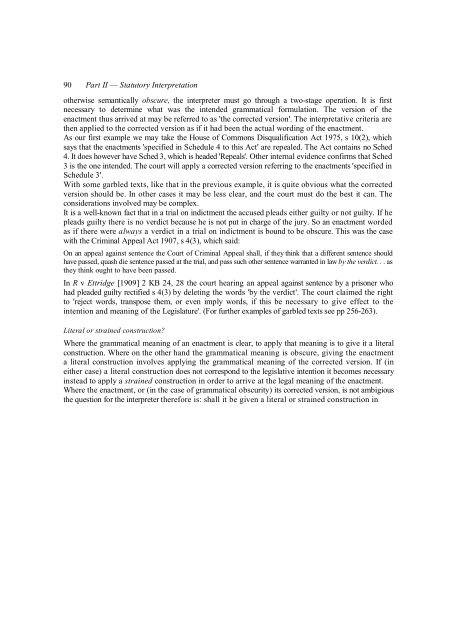Statutory Interpretation The Technique of Statutory ... - Francis Bennion
Statutory Interpretation The Technique of Statutory ... - Francis Bennion
Statutory Interpretation The Technique of Statutory ... - Francis Bennion
Create successful ePaper yourself
Turn your PDF publications into a flip-book with our unique Google optimized e-Paper software.
90 Part II — <strong>Statutory</strong> <strong>Interpretation</strong><br />
otherwise semantically obscure, the interpreter must go through a two-stage operation. It is first<br />
necessary to determine what was the intended grammatical formulation. <strong>The</strong> version <strong>of</strong> the<br />
enactment thus arrived at may be referred to as 'the corrected version'. <strong>The</strong> interpretative criteria are<br />
then applied to the corrected version as if it had been the actual wording <strong>of</strong> the enactment.<br />
As our first example we may take the House <strong>of</strong> Commons Disqualification Act 1975, s 10(2), which<br />
says that the enactments 'specified in Schedule 4 to this Act' are repealed. <strong>The</strong> Act contains no Sched<br />
4. It does however have Sched 3, which is headed 'Repeals'. Other internal evidence confirms that Sched<br />
3 is the one intended. <strong>The</strong> court will apply a corrected version referring to the enactments 'specified in<br />
Schedule 3'.<br />
With some garbled texts, like that in the previous example, it is quite obvious what the corrected<br />
version should be. In other cases it may be less clear, and the court must do the best it can. <strong>The</strong><br />
considerations involved may be complex.<br />
It is a well-known fact that in a trial on indictment the accused pleads either guilty or not guilty. If he<br />
pleads guilty there is no verdict because he is not put in charge <strong>of</strong> the jury. So an enactment worded<br />
as if there were always a verdict in a trial on indictment is bound to be obscure. This was the case<br />
with the Criminal Appeal Act 1907, s 4(3), which said:<br />
On an appeal against sentence the Court <strong>of</strong> Criminal Appeal shall, if they think that a different sentence should<br />
have passed, quash die sentence passed at the trial, and pass such other sentence warranted in law by the verdict. . . as<br />
they think ought to have been passed.<br />
In R v Ettridge [1909] 2 KB 24, 28 the court hearing an appeal against sentence by a prisoner who<br />
had pleaded guilty rectified s 4(3) by deleting the words 'by the verdict'. <strong>The</strong> court claimed the right<br />
to 'reject words, transpose them, or even imply words, if this be necessary to give effect to the<br />
intention and meaning <strong>of</strong> the Legislature'. (For further examples <strong>of</strong> garbled texts see pp 256-263).<br />
Literal or strained construction?<br />
Where the grammatical meaning <strong>of</strong> an enactment is clear, to apply that meaning is to give it a literal<br />
construction. Where on the other hand the grammatical meaning is obscure, giving the enactment<br />
a literal construction involves applying the grammatical meaning <strong>of</strong> the corrected version. If (in<br />
either case) a literal construction does not correspond to the legislative intention it becomes necessary<br />
instead to apply a strained construction in order to arrive at the legal meaning <strong>of</strong> the enactment.<br />
Where the enactment, or (in the case <strong>of</strong> grammatical obscurity) its corrected version, is not ambigious<br />
the question for the interpreter therefore is: shall it be given a literal or strained construction in

















